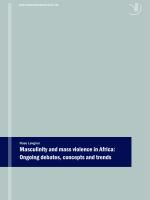How does masculinity relate to violence on the African continent?
At a time when attention to the male gender aspects of violence and security is growing, this DIIS Working Paper by Rose Løvgren analyzes how masculinity has been related to war, conflict and genocide in African countries.
The purpose of the paper is twofold: firstly, by reviewing an extensive literature Rose Løvgren seeks to draw up an overview of the ongoing political and academic discussions in which violence is linked to different understandings of masculinity. Secondly, she problematizes some of the underlying assumptions about gender in general and masculinity in particular and highlight their, at times troubling, political implications.
Violence on the African continent has often been explained with reference to culturally disconnected anxious young men, who react to ‘masculinity in crisis’ with a desire for violence and destruction. Other parts of the literature have argued that especially African patriarchies foster violent political organization. What kind of gendered understandings are produced and foreclosed by these interpretations and how do they affect the political responses to violence?
More recently, men’s participation in war has been explained by a global economic situation that leaves them with no or few other choices of income, and their vulnerability in this situation has received more attention. How can we engage these gender aspects of perpetrating and being subjected to violence academically and politically?
